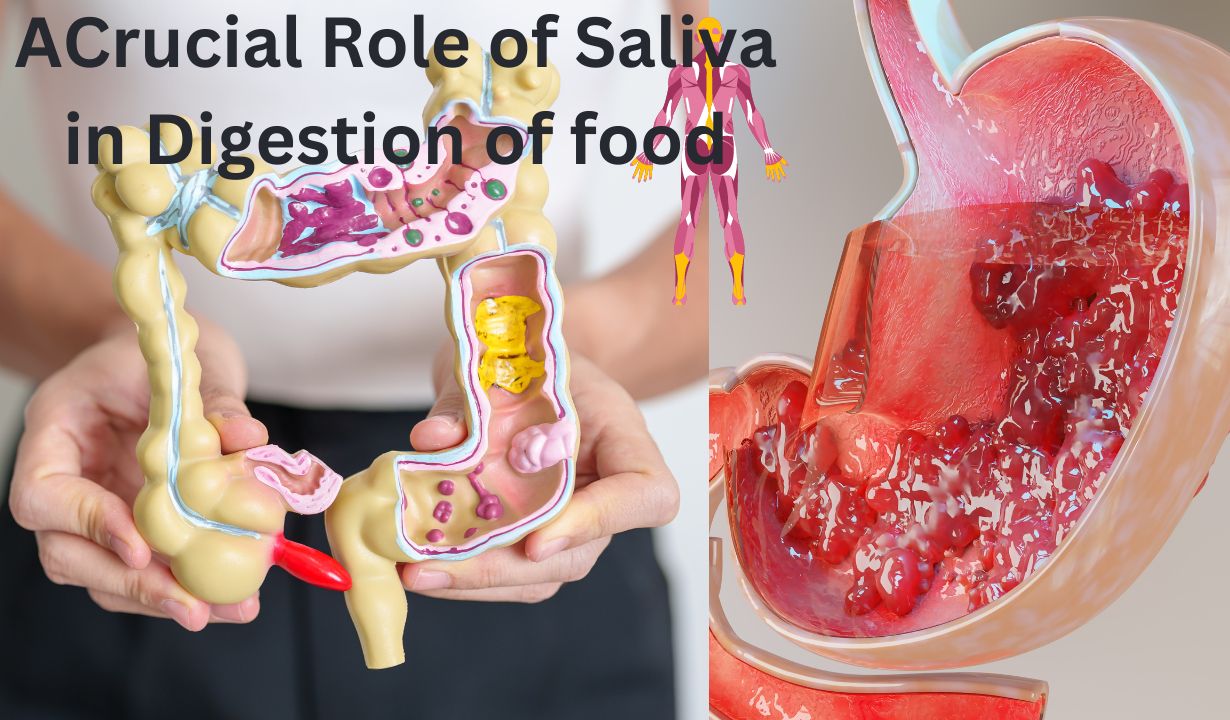enters the mouth. While many of us associate digestion with the stomach and intestines, we often overlook the critical role that saliva plays in this intricate process. Saliva, often dismissed as merely a lubricant for swallowing, is in fact a key player in digestion, serving multiple functions that are essential for breaking down food and initiating the digestive process.

Table of Contents
ToggleComposition of Saliva:
Saliva is a watery fluid produced by the salivary glands located in the mouth. While it is composed primarily of water, saliva also contains enzymes, electrolytes, mucus, and antibacterial compounds. Each component of saliva contributes to its overall functions in digestion and oral health.
Moistening and Lubricating:
One of the primary functions of saliva is to moisten and lubricate food, making it easier to chew, swallow, and travel down the esophagus into the stomach. Without sufficient saliva, the process of swallowing can be uncomfortable and even painful, especially with dry or sticky foods.
Initiating Chemical Digestion:
Saliva contains enzymes that begin the process of chemical digestion even before food reaches the stomach. The most prominent enzyme in saliva is amylase, which breaks down complex carbohydrates into simpler sugars like maltose and glucose. As we chew our food, saliva mixes with it, and amylase starts breaking down starchy foods such as bread, rice, and potatoes into more digestible forms.
Neutralizing Acids:
Another crucial role of saliva is in maintaining the pH balance in the mouth and neutralizing acids produced by bacteria. This helps to protect tooth enamel from erosion and decay. Saliva also contains bicarbonate ions, which help to neutralize acids produced by bacteria and acids from foods and beverages.
Facilitating Taste Perception:
Saliva plays a role in taste perception by dissolving food molecules so that they can interact with taste buds on the tongue. This helps to enhance our ability to taste and enjoy different flavors in foods.
Promoting Oral Health:
Beyond its role in digestion, saliva also helps to maintain oral health. It contains antibacterial compounds and enzymes that help to inhibit bacterial growth in the mouth, reducing the risk of tooth decay and gum disease. Saliva also helps to wash away food particles and debris, keeping the mouth clean and reducing the likelihood of oral infections.
Conclusion:
In summary, saliva is far more than just a watery substance in the mouth. It is a complex fluid with multiple functions that are essential for digestion and oral health. From moistening and lubricating food to initiating chemical digestion and neutralizing acids, saliva plays a crucial role in breaking down food and maintaining a healthy mouth. Understanding the importance of saliva in digestion underscores the significance of good oral hygiene practices and highlights the interconnectedness of various processes in the human body. Next time you eat, take a moment to appreciate the role that saliva plays in making digestion possible.
Navigating Digestion Syrups: Understanding Their Role in Digestive Health
Introduction: In the pursuit of optimal health, digestive wellness stands as a cornerstone. With an increasing emphasis on holistic health practices, individuals are exploring various supplements and remedies to support their digestive systems. Among these, digestion syrups have emerged as a popular choice. But what exactly are digestion syrups, and how do they contribute to digestive health?
Understanding Digestion Syrups: Digestion syrups are liquid formulations designed to support and enhance the digestive process. They typically contain a blend of natural ingredients such as herbs, enzymes, prebiotics, and probiotics, which work synergistically to promote digestive health.
Key Ingredients and Their Roles:
- Herbs: Digestive syrups often include herbs like ginger, peppermint, licorice, and fennel, known for their digestive properties. These herbs help soothe the digestive tract, alleviate discomfort, and aid in the breakdown of food.
- Enzymes: Enzymes such as amylase, protease, and lipase are crucial for breaking down carbohydrates, proteins, and fats, respectively. Digestion syrups may contain these enzymes to support the body’s natural digestive processes.
- Prebiotics and Probiotics: Prebiotics are fibers that serve as food for beneficial gut bacteria, while probiotics are live microorganisms that confer health benefits when consumed in adequate amounts. Both prebiotics and probiotics contribute to gut microbiota balance and overall digestive wellness.
Benefits of Digestion Syrups:
- Relief from Digestive Discomfort: Digestion syrups can help alleviate symptoms of indigestion, bloating, gas, and discomfort associated with digestive issues.
- Improved Nutrient Absorption: By aiding in the breakdown of food and supporting gut health, digestion syrups may enhance nutrient absorption, ensuring that the body receives essential vitamins, minerals, and nutrients from food.
- Support for Gut Microbiota: The balance of gut microbiota plays a vital role in overall health. Digestion syrups containing probiotics and prebiotics can help maintain a healthy gut environment by promoting the growth of beneficial bacteria.
Choosing the Right Digestion Syrup: When selecting a digestion syrup, consider the following factors:
- Ingredients: Opt for syrups containing natural, high-quality ingredients without unnecessary additives or fillers.
- Formulation: Look for a well-balanced formulation that addresses your specific digestive needs, whether it’s soothing irritation, aiding digestion, or supporting gut flora.
- Quality and Reputation: Research the brand’s reputation, certifications, and manufacturing practices to ensure product quality and safety.
Conclusion: Digestion syrups offer a natural and effective way to support digestive health and overall well-being. With their blend of herbs, enzymes, prebiotics, and probiotics, these syrups can help alleviate digestive discomfort, enhance nutrient absorption, and promote a healthy gut environment. When incorporated into a balanced lifestyle that includes a nutritious diet and regular exercise, digestion syrups can be valuable allies in the journey toward optimal digestive wellness.


Very nice